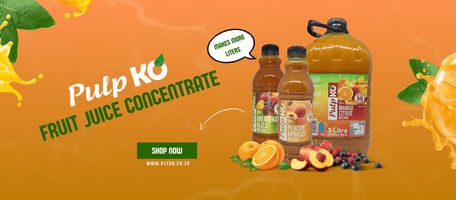
How to Mix It Perfectly:
Tips for Using our PulpKO Juice Concentrates.
Step 1: Read the Label
All of our PulpKO concentrates have specific instructions for the best dilution ratio, often found on the label.
Step 2: Gather Your Tools
You'll need:
A measuring cup or spoon. A mixing jug or pitcher. Clean, fresh, cold water (filtered or tap, based on preference)
Step 3: Measure the Concentrate
Pour the correct amount of concentrate into your mixing jug. For example, if you're making 1 liter of juice with a 1:4 ratio, you’ll need 200 ml of concentrate.
Step 4: Add the Water
Add the water gradually, based on the recommended ratio. Using the same example, you'd mix in 800 ml of water to the 200 ml of concentrate.
Step 5: Stir Well
Use a spoon or stirrer to mix the water and concentrate thoroughly. Proper mixing ensures the flavour is distributed evenly.
Step 6: Taste Test
Take a small sip to check the flavour. If it's too strong, add a splash of water. If it's too weak, mix in a little more concentrate. Adjust to suit your preference!
Step 7: Serve and Enjoy
Pour into a glass with ice for an extra chill. Garnish with fresh fruit slices or herbs like mint if you’re feeling fancy.
Pro Tip: Storing Leftovers
If you've made a large batch, store any leftovers in the fridge in a sealed jug. Consume within a few days for the best taste and freshness.
Perfectly mixed juice isn't just about the ratio; it's about finding that balance that delights your palate. Enjoy your Pulpko juice experience! 🍹
